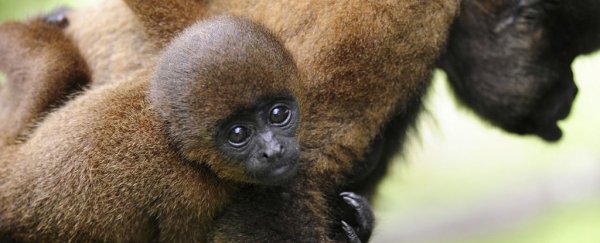While some countries struggle to uphold human rights, Ecuador has forged ahead and ruled wild animals possess distinct legal rights, including the right to exist.
This 7-2 court ruling in February was a landmark interpretation of the country's "rights of nature" constitutional laws and elevated the legal status of nonhuman animals.
"In America, the rights of nature sounds like a fringe idea, but people don't realize how mainstream it is around the world," Kristen Stilt, an expert in animal law, told Inside Climate News.
The ruling arose from the sad case of a woolly monkey named Estrellita. After being Illegally taken from the wild, Estrellita came to live with librarian Ana Beatriz Burbano Proaño and her family at just one month old, where she lived for the next 18 years. During this time, she learned to communicate with them through gestures and sounds and acquired the family's customs.
Estrellita was then seized by local authorities and suffered a sudden cardio-respiratory arrest within a month of being relocated to a zoo, where she passed away.
Before hearing of her death, Burbano filed a case to get Estrellita back, citing the distress Estrellita was likely experiencing, having been so abruptly torn from everything familiar to her.
The case relied on scientific evidence of the cognitive and social complexity of woolly monkeys (Lagothrix sp.) to argue Estrellita "should at minimum possess the right to bodily liberty" and the "environmental authority should have protected Estrellita's rights by examining her specific circumstances before placing her in the zoo."
The court ruled that both the authorities and Burbano violated Estrellita's rights, the former for failing to consider her specific needs before relocating her and the latter for removing her from the wild in the first place.
The court proposed that new legislation be drafted to better uphold these rights in the future.
"The domestication and humanization of wild animals are phenomena that have a great impact on the maintenance of ecosystems and the balance of nature, as they cause the progressive decline of animal populations," the court recognized in its ruling.
The decision follows a landmark ruling in Ecuador last year that found mining in a protected cloud forest violates the rights of nature.
Ecuador was the first country in the world to recognize the rights of nature at a constitutional level back in 2008.
"While rights of nature were enshrined in the constitution, it was not clear prior to this decision whether individual animals could benefit from the rights of nature and be considered rights holders as a part of nature," Ecuadorian environmental lawyer Hugo Echeverría explained in a statement. "The court has stated that animals are subject of rights, protected by rights of nature."
Countries like New Zealand and Canada, along with other provinces and some US cities, have treaties, provisions, or local laws that afford wild animals some similar protections. However, countries have yet to enshrine such rights at constitutional levels, and in many places around the world, attempts to protect nature remain life-threateningly dangerous.
The ruling makes it clear that these rights to "exist, flourish, and evolve", however, fall within the context of ecological processes, which include biological interactions between species like predation. They do not equate animals to human beings but still extend them the right to be free within the context of ecological interactions.
This means hunting, fishing, gathering, and forestry are still allowed as long as they're performed within other pre-existing laws – for example, not in defiance of endangered species acts – and are carried out in ways that limit suffering.
"Typically, environmental law has not concerned itself with animals that aren't considered important species, such as endangered species covered by the US Endangered Species Act," said Stilt. "There is a reckoning starting to happen that is breaking down the silos of animal law and environmental law, and this case is an important part of that development."
This bridging between the two areas recognizes how interconnected our world is. It only takes one unfortunate interaction with a wild animal to start a pandemic or the destruction of a few key individuals to bring down an entire vulnerable species, after all.
The climate crisis and six mass extinction are intrinsically linked with each other and our attitudes and actions towards the life we share our planet with.
So in a world where environmental destruction is now touching so many of us personally, such laws could help steer us as individuals and societies into making better choices that could benefit us all.
"These laws are already proving to be an important legal tool to protect nature, including animals," Stilt concluded.
The full ruling can be found here in English and in the original in Spanish here.
